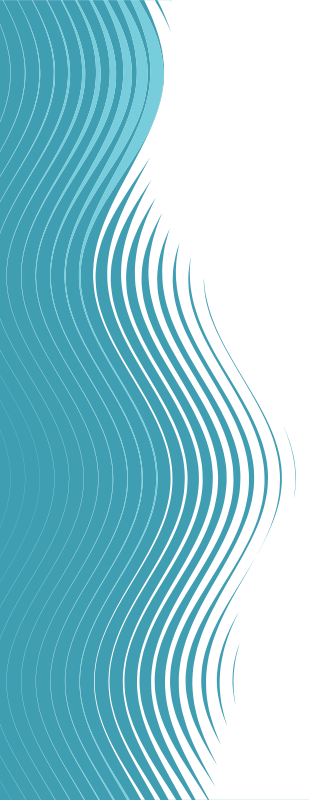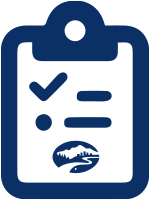Invasive Mussels
Prevent the spread of Invasive Mussels to British Columbia
Invasive zebra and quagga mussels pose a very serious threat to the lake environment, drinking water, tourism and the economy. Whether you’re a resident or a visitor to the Shuswap, whether you’re a boater, paddler or fisher — you need to take part in prevention!
Travellers into British Columbia with a watercraft of any kind are required to stop for inspection, and decontamination if necessary. Decontamination of watercraft is provided free of charge by the BC Conservation Officer Service.
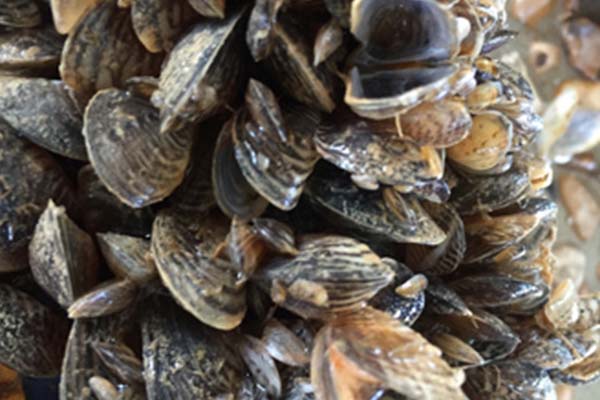
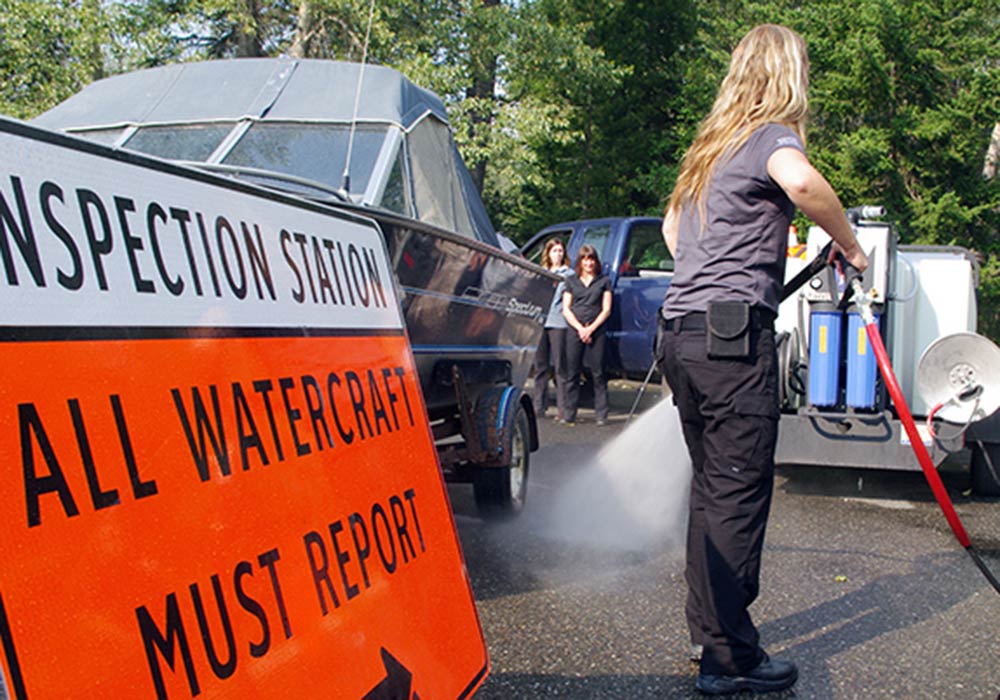
Photo credit: BC Conservation Officer Service.
What you need to do
If you are moving a boat or watercraft of any kind, you are required to stop at watercraft inspection stations that are on your travel route into and around British Columbia.
It’s critically important that everyone help prevent the spread of invasive zebra and quagga mussels.
Watercraft inspection stations are set up along highways at entry-points to BC and are staffed by the BC Conservation Officer Service. When you travel with a watercraft, stopping at inspection stations is required by law. Failing to stop can result in a $345 fine. Staff will inspect and, if necessary, decontaminate your watercraft (free of charge).
If you’ve arrived in the Shuswap from outside of BC and did not stop at an inspection station, please phone the provincial hotline 1-877-952-7277 before you launch your watercraft. You can learn more about watercraft inspection and bringing a boat to BC by visiting the BC government website.
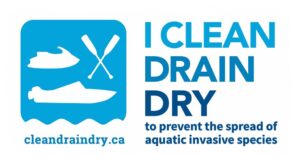
All watercraft users should also practice clean-drain-dry, a three-step process to help eliminate invasive species from watercraft.
After removing a watercraft from the water, clean it to remove mud, plant material, small aquatic life and other debris.
Drain all compartments onto dry land.
Ensure your boat or watercraft is thoroughly dried before relaunching.
Clean-drain-dry helps prevent the movement of other invasive species such as Eurasian water milfoil and whirling disease.
What do boaters and watercraft have to do with it?
One of the most common ways that zebra and quagga mussels move from one waterbody to another is on watercraft and fishing gear, which can become contaminated with mussels if they’ve been used in a lake or river where the mussels are present.
Adult mussels can attach themselves directly, and juvenile mussels float freely in trapped water. There are many places they could be: the bilge, ballast, bait bucket, anchor, hull, trailer, prop, engine coolant system — and that’s just for boats. They could also be “hiding” on kayaks, canoes, stand up paddleboards, waders or water toys. They’re not easy to spot. Fully grown adult mussels are the size of your thumbnail. Newly established adult mussels are only a millimetre or two, and juvenile mussels are smaller than a grain of sand.
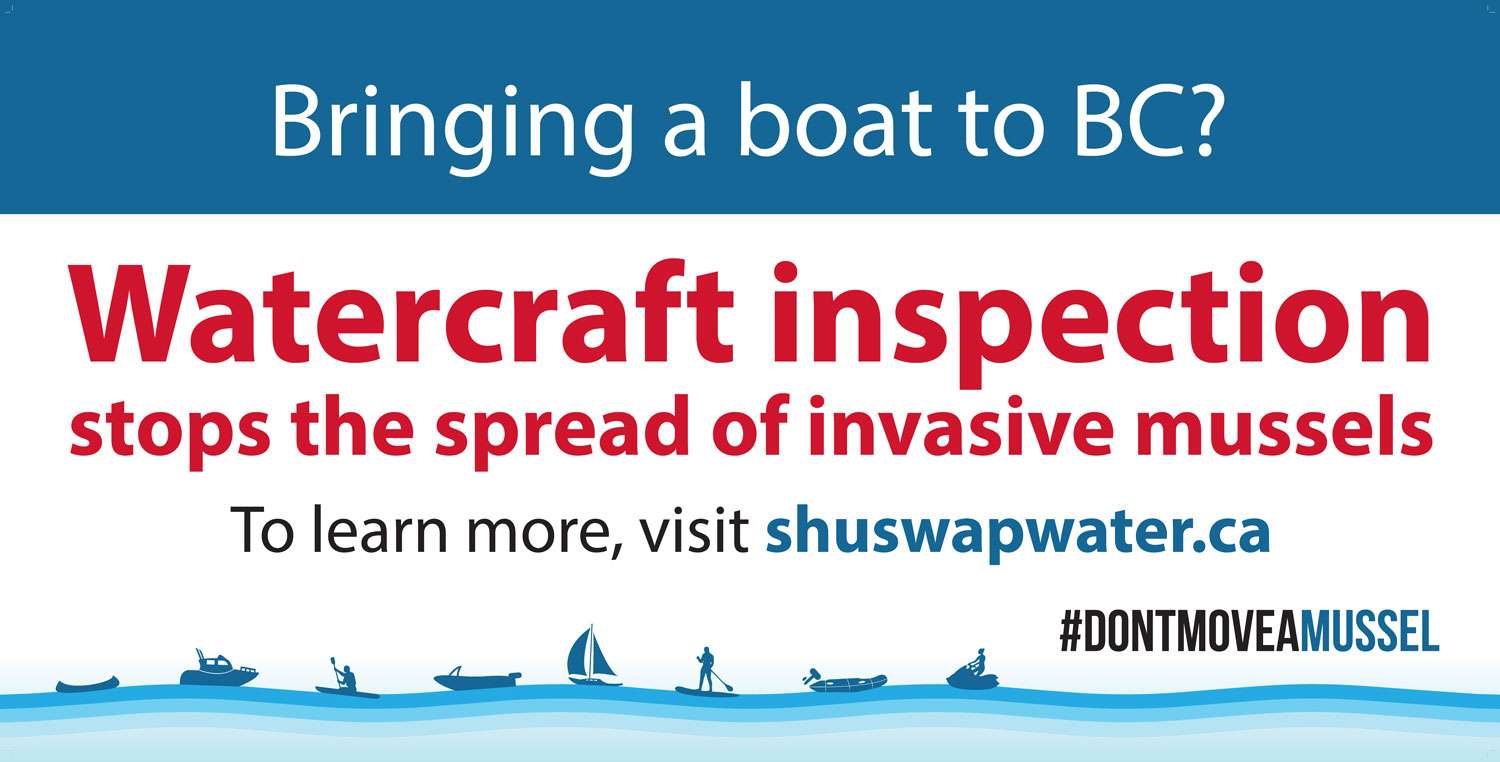
What are zebra and quagga mussels?
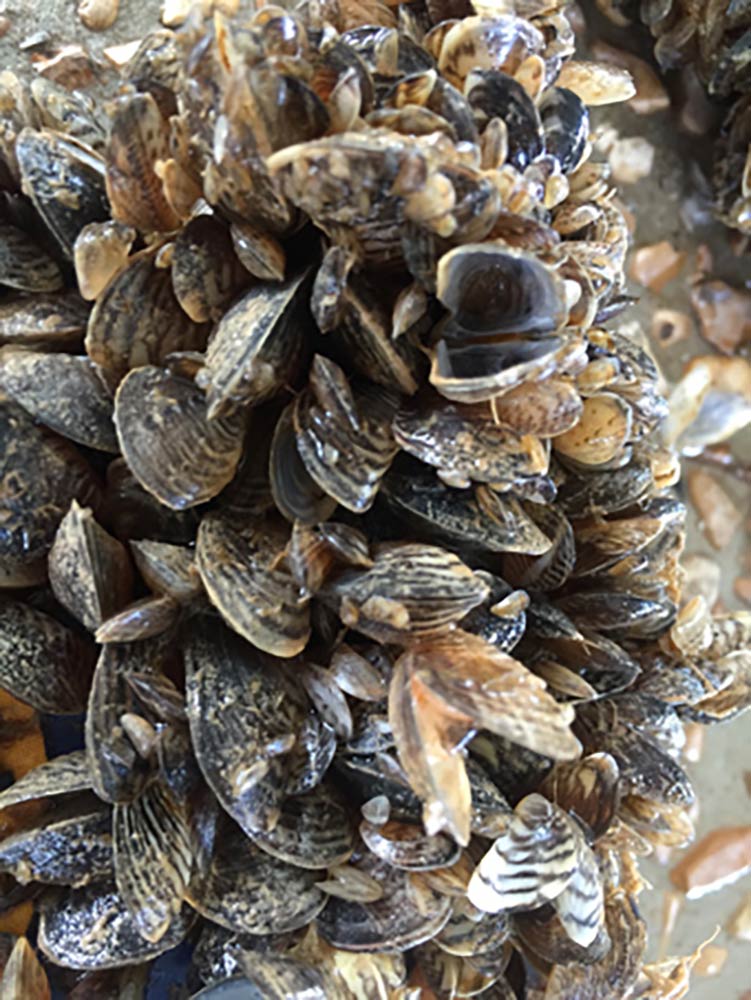
Invasive zebra and quagga mussels often grow in clusters. This is one characteristic that makes them so destructive. Photo: Columbia Shuswap Invasive Species Society

Invasive zebra and quagga mussels often grow in clusters. This is one characteristic that makes them so destructive. Photo: Columbia Shuswap Invasive Species Society
Zebra and quagga mussels don’t belong in the Shuswap, in BC, or elsewhere in Canada. They were unintentionally brought to North America in the 1980s on ships coming from Europe, where the mussels originate. Since then, they have spread to many lakes and rivers in Eastern and central North America, including Quebec, Ontario, Manitoba and as far west as California. There is no known presence of invasive mussels in British Columbia. In 2023, quagga mussels were detected in Idaho, the closest-known presence of invasive mussels.
Zebra and quagga mussels are two different species (Dreissena spp.), but similar in size and appearance:
The good news is the mussels are not known to be present in Shuswap Lake, or anywhere in BC. Nor are they established in Alberta, Saskatchewan, Washington or Oregon.
Let’s keep it that way!
By comparison, native freshwater mussels in BC:
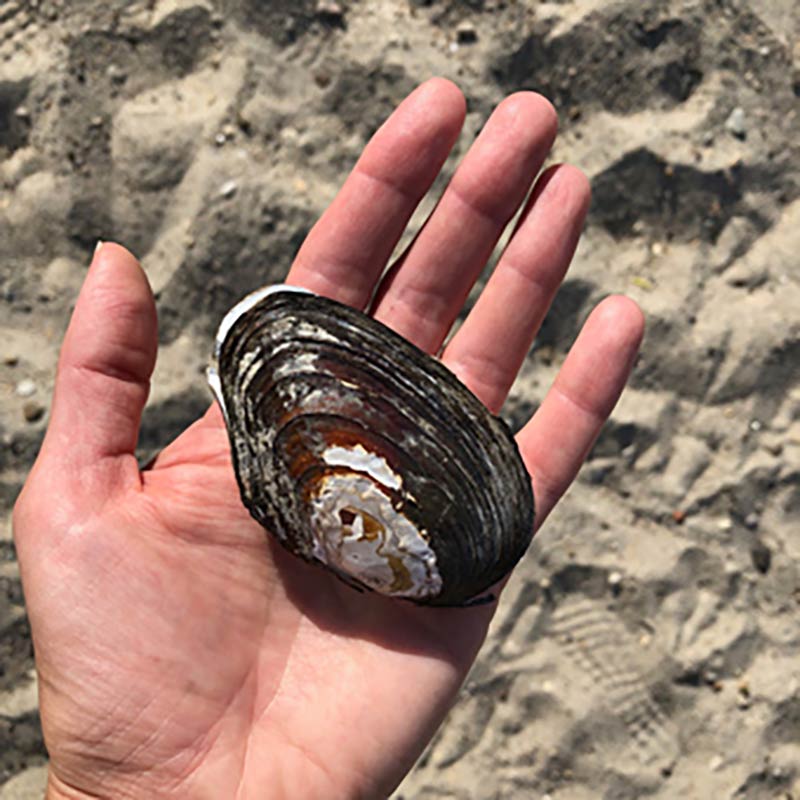
This is an example of a native freshwater mussel. This particular specimen was found on the shore of Little Shuswap Lake near Chase.
Native Mussels vs Zebra & Quagga mussels
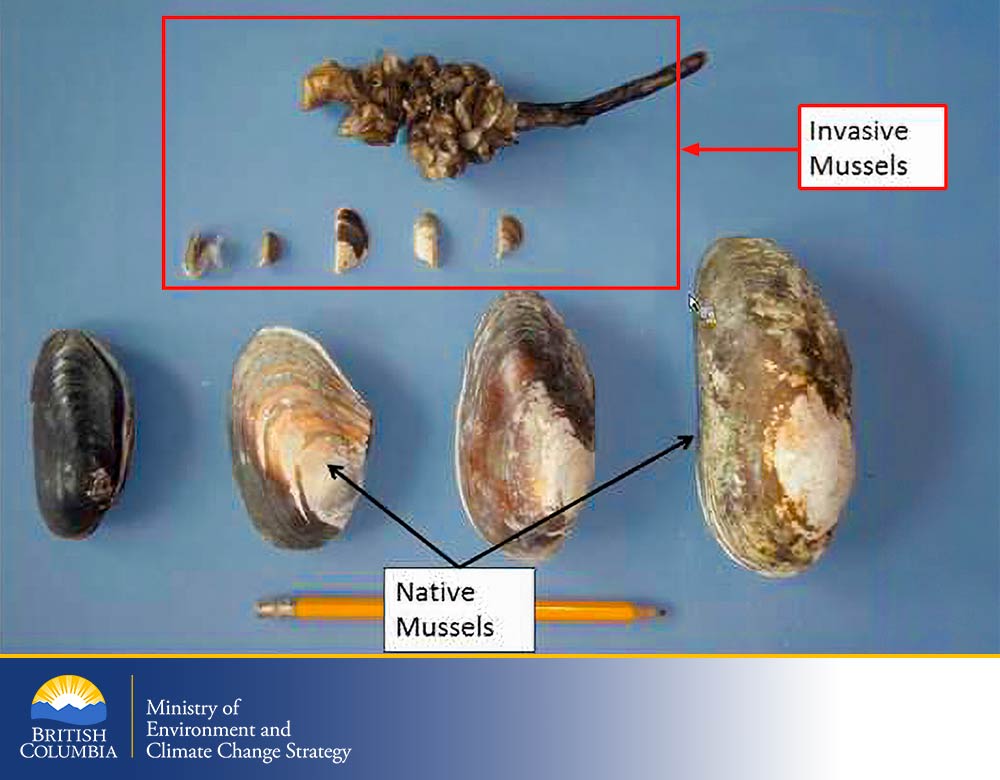
Watch this 10-minute introductory video from an SWC partner organization, the Columbia Shuswap Invasive Species Society (CSISS). Learn about aquatic invasive species, why they matter, and how you can help prevent their spread.
The impacts and costs of an invasion
Zebra and quagga mussels will impact many of the Shuswap’s treasured assets:
Zebra and quagga mussels colonize on surfaces underwater. Removing the colonies from infrastructure including pipes, dock pilings, and watercraft would require ongoing maintenance now estimated at a cost of up to $129 million annually for BC residents according to a 2023 economic impact report from the Province of BC. Everyone in BC will be affected by this cost, which includes hydro-electric infrastructure, water supply infrastructure (e.g., municipal and domestic water), irrigation for agriculture and golf courses, maintenance for boats and marinas, loss in profits and revenues from the tourism sector, loss in residential property values, and loss in property tax revenues for governments.
Everyone will pay to manage and mitigate the impacts of invasive mussels. Time spent enjoying the lake will change to time spent cleaning colonies and shells from pipes, docks, watercraft and beaches.
There’s more. If the mussels become established in the Shuswap — and it would only take one contaminated watercraft to enable that — they are virtually impossible to get rid of. If they’re introduced to the Shuswap, they’d be here to stay. And, worse yet, they reproduce at alarmingly high rates. A few mussels could become millions in a year.

Preventing the spread of invasive mussels to BC is our best option.
Monitoring the Shuswap for zebra and quagga mussels
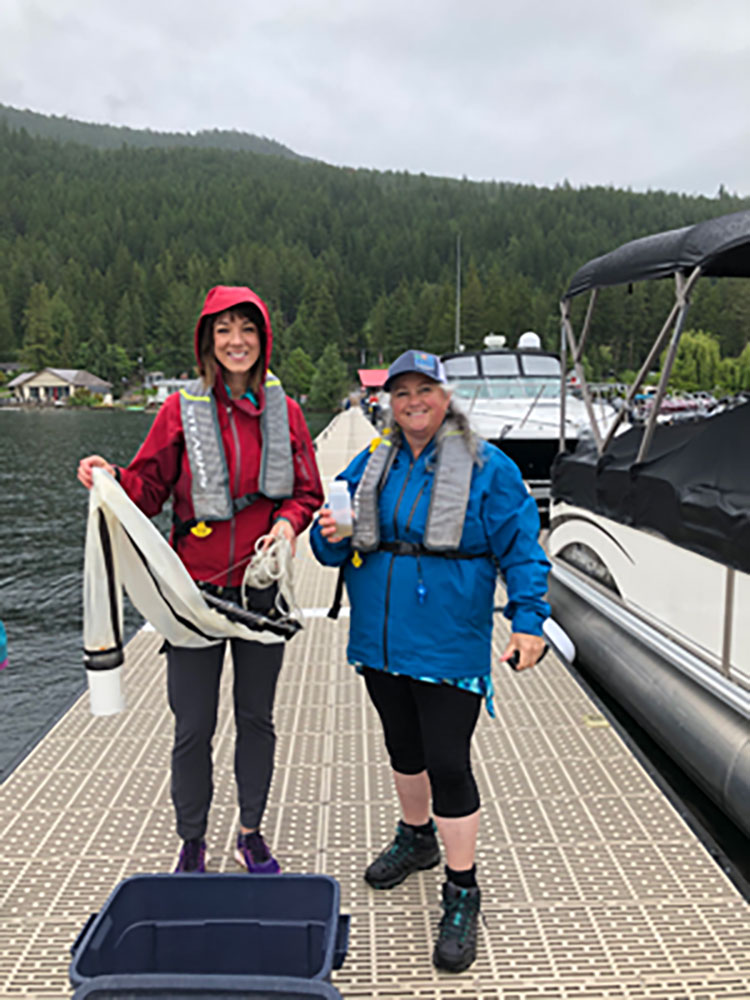
Erin Vieira (Shuswap Watershed Council) and Sue Davies (Columbia Shuswap Invasive Species Society) monitoring Shuswap Lake for invasive mussels at Blind Bay, June 2020
Early detection monitoring for invasive zebra and quagga mussels is carried out in the Shuswap watershed by the Columbia Shuswap Invasive Species Society (CSISS), with financial support from the Shuswap Watershed Council. This monitoring is important to determine if the mussels have invaded the Shuswap. For the past several years, CSISS has monitored several locations in the Shuswap watershed, multiple times throughout the spring, summer and fall months. To date, all the water samples have had negative results, meaning that they have never been found in the Shuswap.
The work of the SWC and the CSISS is part of a larger effort across the province to monitor several lakes in British Columbia for invasive mussels. This is done according to the Provincial Invasive Mussel Field Protocol, set by the BC Ministry of Environment and Climate Change Strategy. It is supported by funding from the Habitat Conservation Trust Foundation and other agencies.
If invasive zebra and quagga mussels were to reach the Shuswap, it is important to know as soon as possible and take swift action. The BC Ministry of Environment and Climate Change Strategy is the lead agency responsible for responding to a new invasive species. Their Zebra and Quagga Mussel Early Detection and Rapid Response Plan for British Columbia would guide the response.
Report invasive species
Suspected sightings of zebra and quagga mussels — or other aquatic invasive species, such as invasive clams — should be reported to the BC government using one of the following methods:
Top Banner Photo: Darren Robinson, Shuswap Tourism

